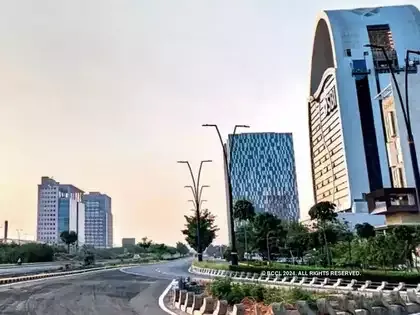- Kunvarji Realty
- 03/01/2024
- 340 views
Raise a glass to GIFT City: Why the recent amendment to the teetotaller mandate is a gamechanger in the dry state
Source: The Economic Times
“You get hot piping dosas in at least 5 places in Singapore, and if you are feeling low, you can go to your neighbourhood temple and pray," a private banker to several of our billionaires once told me once what really moved the needle and transformed the city state into the favourite global suburb.
With Gujarat International Finance Tec-City (GIFT IFSCA) Prime Minister Narendra Modi is seeking to recreate a Singapore by the Sabarmati -- Integrate Indian financial markets with international capital flows. A global nerve centre for new-age financial and technology services, as he put it to delegates recently, even when we had a thriving hub in Mumbai, an obvious choice, with both pre-existing infrastructure and talent, that had even allocated space which today sadly is going to be a terminus for the Bullet Train.
The decision to allow serving of alcohol inside the City premises, even with multiple fine prints, in a dry state like Gujarat will certainly lift the spirits of everyone who aspires to be work, live and play in this 15-year old free market oasis that already boasts of 580 operational entities, including 3 exchanges like international bullion exchange, 25 banks, with 9 foreign banks, 29 insurance entities, 2 foreign universities, and over 50 professional services providers, consulting, law, CA firms but no night life.
This should ideally be followed up with a relaxed liquor regimen across the state to boost tourism, a cornerstone of the double engine BJP government.
Take a leaf out of Dubai which also an international financial centre like New York, Shanghai, Shenzhen, San Fran, London or Tokyo. It ended its 30% tax on alcohol sales in the sheikhdom on January 1 2023 and made its required liquor licenses free to obtain to further boost tourism. Over the years it has been relaxing rules over booze in the city state to allow sale of liquor even during the day in Ramazan, providing home delivery since Corona lockdown.
Smart businesses in the beginning of the 17th century set sail for London or Amsterdam. Their Asian outposts, Calcutta ( now Kolkata) and Manila were recognised as hubs in a growing network of European commerce, which have since lost its lustre. The 20th century saw the rise of New York City. And at the beginning of the 21st century, both trade and capital found a way to reach the southernmost tip of the Malay Peninsular - to the city state of Singapore, coinciding with the commensurate rise of Asia as the fastest growing economic bloc with thriving new global finance centers like Hong Kong, Shanghai and Singapore. But Hong Kong has become an Orwellian dystopia under Beijing’s authoritarianism and London’s pull out from the European bloc dulled its deal making prowess making both bustling metropolises but lesser international financial centres.
You can be drawn in by low tax rates, a deep reservoir of private banking talent, credible trust laws that aid inheritance planning and regulatory governance and lends credibility that rival Switzerland and other traditional centres that were the default jurisdictions for the high net worth individuals from around the world and even India but beyond the Singapore sling, penthouses and skyscrapers, jaw dropping rents, swanky airport connectivity, busiest trans-shipment and tax treaties, what really makes the difference is its cosmopolitan ethos and the quality of life. I call it the Dosa doctrine. Global spotlight on Swiss and Dubai banks have further propelled its position as the Switzerland of Asia but without the black money.
What makes an international finance sector tick?
Regulators are key to creating an atmosphere where finance can flourish. A deep capital markets and banking services are obvious handmaidens. Both makes it easier to become a hub for wealth created elsewhere in the globe to be managed and invested. The establishment of the International Financial Services Centres Authority as a unified regulator in 2020 has been a key milestone in GIFT City’s evolution. IFSCA has formulated 27 regulations and more than 10 frameworks, opening up new avenues for investment. Within the 886 acres between Ahmedabad, the state’s biggest city and its capital Gandhinagar, bankers have cumulatively handled transactions worth $508 billion till July 2023; with total banking assets stood at $41.20 billion, and cumulative derivative transactions booked by banks were worth $632 billion.
Global think tank Z/Yen partners, which compiles an index of financial centres, looks at five areas of competitiveness: business environment, human capital, infrastructure, financial-sector development and reputation. Each segment is further split into four underlying buckets to deduce a final score for each city. New York tops that list in 2023, Mumbai a dismal 61, GIFT-CITY 67, below Madrid, Wellington, Chendu and even Casablanca.
Gujarat’s Canary Wharf may offer district cooling, an energy-efficient air conditioning system, as well as central waste, water and electricity management but that does not make it liveable. Bank of America, HSBC, JP Morgan, ICICI Bank may occupy glass and chrome skyscrapers that have risen from backwoods. But that will not help in talent migration. Schools would. Chic diners and modern healthcare in close proximity will make the City liveable.
By amending the teetotaller mandate – in place with greater rigidity in the state after it was created out of the erstwhile Bombay state in 1960, as a mark of respect to Mahatma Gandhi, the Father of the Nation and a Gujarati and fierce critic of the vice – Gift City will finally be able to woo young talent and ensure the project’s success. Around the world, liquor lubricates many finance deals. It all boils down to the after hours.
